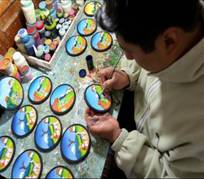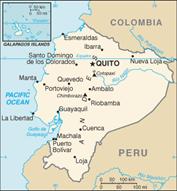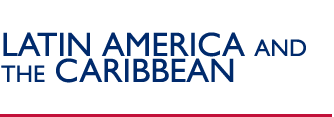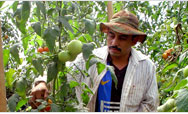
This artist and entrepreneur sells his clay and plaster sculptures to tourists that visit his hometown of Pujili in Cotopaxi. Access to USAID-supported micro-credit allowed him to purchase raw materials used for his artwork. He will use additional loans to expand his workshop and increase production. In Ecuador, USAID‘s assistance helped strengthen and consolidate the micro-finance sector and promoted innovations that will secure its regional leadership, introducing new and improved international practices.

CONTACT INFORMATION
Mission Director
Alexi Panehal
Unit 5330 - USAID
APO, AA 34039
Tel: (593-2) 223-2100
E-mail: apanehal@usaid.gov
Ecuador Desk Officer
(Washington)
Karen Anderson
Tel: (202) 712-4876
E-mail: kanderson@usaid.gov |
|
Overview
Ecuador is a developing country with a lower-middle per capita income. U.S. assistance to Ecuador focuses on promoting democracy, enhancing security and counter-narcotics cooperation, and furthering economic development. USAID/Ecuador’s vision, approved in the Country Strategy Statement in July 2006, is: “Ecuadorians create an equitable, sustainable economy with strong democratic institutions.”
Ecuador has enjoyed 27 years of civilian rule, yet its democracy remains fragile. None of the previous three elected presidents have finished their terms in office, and eight presidents have served over the last decade. Despite its chronic instability, Ecuador’s importance to U.S. interests far outstrips its size. Ecuador is a key ally in regional U.S. efforts to counter narcotics, human trafficking, and terrorism.
To address development challenges that include poverty, exclusion and lack of good governance, USAID/Ecuador has four principal foreign assistance objectives: increase support for the democratic system, improve the quality of life of the population living along Ecuador`s borders, promote sustainable and equitable economic development, and conserve biodiversity.
Programs
Peace and Security and Investing in People
This program contributes to the economic and social development of northern and southern borders populations. The objectives of the program are to generate job opportunities and licit income, strengthen local government’s capacity, and the development of clusters to improve their production and market opportunities at national and international levels. In 2007, USAID-supported farmers more than doubled their yields in cacao and coffee crops and family incomes went up two-fold due to productivity increases and quality improvements. Participant farmers currently export nearly 100% of their cacao, coffee and broccoli products to the United States, European Union, Japan, and Colombia. Additionally, USAID provided access to improved drinking water to 373,265 people and sanitation facilities to 115,245 people.
Governing Justly and Democratically
The program contributes to strengthening the democratic system by supporting local governments, enhancing access to justice, broadening civil society participation in key democratic processes, and promoting both transparent and inclusive elections. With USAID support, 53 local governments have implemented participatory planning processes and have improved municipal management practices to improve service delivery. USAID also helped more than 10,000 persons from vulnerable groups access defense services and legal assistance in nine cities throughout the country, and carried out important improvements in the application of criminal justice system in Cuenca. USAID also mobilized about 10,180 persons, especially youth, to oversee three elections in a period of 12 months.
Economic Growth
USAID contributes to poverty reduction by promoting trade and competitiveness and promoting necessary reforms. The program supports productive clusters, with an emphasis on micro-enterprises, to improve their quality and promote access to new markets. In 2007, USAID supported three public-private dialogue mechanisms: 1) it created the Ecuadorian Committee for Territorial Economic Development from nine provincial economic councils; 2), it strengthened each of the nine councils and their 186 local members to enable small businesses to participate in the development of economic policy; and 3) it worked with the Government of Ecuador and private banks to redirect microfinance subsidies to underserved areas.
Biodiversity Conservation
USAID efforts focus on the conservation of natural resources in Ecuador, particularly in the National System of Protected Areas, including the Galapagos, indigenous territories, and in watershed conservation. The program strengthens the capacity of local groups in order to carry out effective conservation actions and to promote tourism in protected areas, resulting in economic benefits for the communities along these borders. In the Galapagos, USAID has provided support in the area of participative management, marine reserve zoning, and sustainable tourism to benefit local communities.
Other Initiatives
1) Combat trafficking in persons including prevention and protection of victims; 2) Inclusive development to promote the participation of persons with disabilities in democratic processes and labor integration; 3) Centers of Excellence for Teacher Training to improve reading and writing teaching skills; 4) Disaster preparedness and humanitarian assistance for victims of natural disasters.
|


